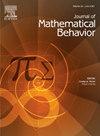Encouraging students to explain their ideas when learning mathematics: A psychological perspective
IF 1.7
Q3 EDUCATION & EDUCATIONAL RESEARCH
引用次数: 0
Abstract
Children’s self-explanations are answers to voiced why and how questions that attempt to make sense of new information for oneself. They often are not sophisticated or generalizable. Despite this, prompting children to generate explanations often improves their learning. After providing examples of children’s explanations, this article summarizes empirical evidence for the learning benefits of prompting people to generate explanations when learning mathematics. There is strong evidence that prompting learners to explain leads to greater conceptual knowledge, procedural knowledge and procedural transfer when knowledge is assessed immediately after the learning session; there is limited evidence for greater procedural transfer after a delay. Scaffolding high-quality explanations via training or structured responses, designing prompts to carefully balance attention to important content, prompting learners to explain correct information, and prompting learners to explain why incorrect information is incorrect when appropriate, increases the benefits of prompts to generate explanations.
鼓励学生在学习数学时解释自己的想法:心理学视角
儿童的自我解释是对 "为什么 "和 "怎么做 "等问题的回答,目的是为自己理解新信息。它们往往不够成熟,也不具有普遍性。尽管如此,促使儿童做出解释往往能提高他们的学习效果。在举例说明了儿童的解释之后,本文总结了实证证据,说明在学习数学时,促使学生做出解释对学习有好处。有确凿证据表明,在学习课程结束后立即对知识进行评估时,促使学习者进行解释会带来更多的概念性知识、程序性知识和程序性迁移;而在延迟后进行评估会带来更多程序性迁移的证据则很有限。通过培训或有条理的回答为高质量的解释搭建脚手架,设计提示语以谨慎地平衡对重要内容的关注,提示学习者解释正确的信息,并在适当的时候提示学习者解释错误信息不正确的原因,这些都会增加提示产生解释的益处。
本文章由计算机程序翻译,如有差异,请以英文原文为准。
求助全文
约1分钟内获得全文
求助全文
来源期刊

Journal of Mathematical Behavior
EDUCATION & EDUCATIONAL RESEARCH-
CiteScore
2.70
自引率
17.60%
发文量
69
期刊介绍:
The Journal of Mathematical Behavior solicits original research on the learning and teaching of mathematics. We are interested especially in basic research, research that aims to clarify, in detail and depth, how mathematical ideas develop in learners. Over three decades, our experience confirms a founding premise of this journal: that mathematical thinking, hence mathematics learning as a social enterprise, is special. It is special because mathematics is special, both logically and psychologically. Logically, through the way that mathematical ideas and methods have been built, refined and organized for centuries across a range of cultures; and psychologically, through the variety of ways people today, in many walks of life, make sense of mathematics, develop it, make it their own.
 求助内容:
求助内容: 应助结果提醒方式:
应助结果提醒方式:


